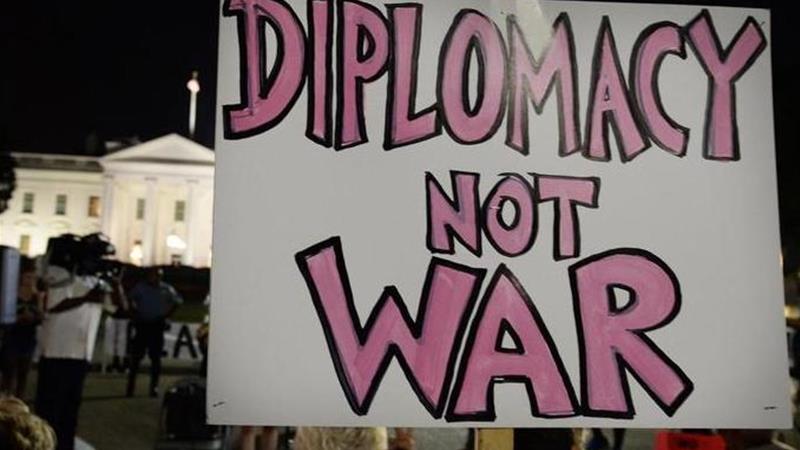Home » Middle East »
Is chemical inspectors' OPCW mission in Syria still relevant?
Despite Saturday night’s air strikes in Syria, the OPCW has said it will continue its fact-finding mission in Douma.
Representatives of the Organisation for the Prohibition of Chemical Weapons (OPCW) have arrived in Damascus, where they will conduct a so-called ‘fact-finding mission’ into the chemical attack in Douma on April 7.
The OPCW will try “to establish facts surrounding allegations of the use of toxic chemicals, reportedly chlorine, for hostile purposes in the Syrian Arab Republic” in the Damascus suburb of Douma.
According to the organisation, its mission will continue despite Saturday night’s air strikes by the United States, French and British forces, aimed at destroying Syrian chemical weapons facilities.
That mission was announced on April 10, three days after the chemical attack in which at least 85 people were killed and hundreds were injured.
The countries that conducted last night’s air strikes on at least three targets in the war-torn country have all claimed they have proof of the Syrian regime being behind the attack on Douma, raising the question how much the OPCW will actually accomplish.
Below is an explainer on the OPCW and its mission in Syria.
What is the OPCW?
The OPCW was founded as part of the Chemical Weapons Convention of 1992 which went into effect in 1997, aiming to eradicate all chemical weapons stockpiles around the world.
In total, the OPCW has 192 member states.
The organisation, which works closely with the United Nations, was behind the destruction of chemical weapons caches in Syria, which lead to the OPCW being awarded the 2014 Nobel Peace Prize.
What has the OPCW done in Syria so far?
The OPCW lead the campaign to destroy Syria’s chemical weapons stockpiles in 2014.
That mission was a result of a deal struck between Syria, the US and Russia after the Syrian government killed anywhere between 300 and 1,400 people in a chemical attack in the city of Ghouta. More than 3,000 people were injured in that attack.
Following that attack, the US threatened Syria with military retaliation, but eventually struck a deal leading to the dismantling of Syria’s chemical weapons stockpile.
In September of that year, head of the joint OPCW-UN mission Sigrid Kaag said in a statement that more than 96 percent of all chemical weapons stockpiles in the country had been destroyed.
But that did not stop the President Bashar al-Assad government from using poisonous gas on its people.
The OPCW was sent there on fact-finding missions on many occasions.
In May 2014, several of these missions were done, leading to a report presented in September of that year claiming there was “compelling confirmation that a toxic chemical was used as a weapon, systematically and repeatedly, in the villages of Talmanes, Al Tamanah, and Kafr Zeta in northern Syria”.
A year later, in 2015, the OCPW went on another mission regarding alleged use of chemical weapons in three instances.
In its report following that mission, which focused on only one event, the OPCW said it “could confirm, therefore, with the utmost confidence that at least two people were exposed to sulfur mustard”, adding that it was highly likely a baby died as a result of the chemical attack.
The OPCW also investigated an alleged chemical attack in August 2016. Based on the evidence gathered during that mission, the organisation could not say with certainty a chemical weapon was used in the attack.
The OPCW also went on a fact-finding mission in the wake of the Khan Sheikhoun gas attack in April 2017 in which at least 83 people, a third of them children, were killed and nearly 300 wounded.
This attack was what triggered US President Donald Trump to launch a limited strike on several Syrian targets, most notably the airbase from where the attack on Khan Sheikhoun was launched.
In June 2017, the OPCW released its report, saying “a large number of people, some of whom died, were exposed to sarin or a sarin-like substance”.
What will this OPCW mission try to accomplish do?
The new OPCW fact-finding mission, which started on Saturday despite the air strikes, will try to establish what exactly happened during the suspected chemical attack in Douma.
The team will interview victims, visit the site of the attack and try to get information from the Syrian government.
Based on the information gathered, the OPCW will release a report detailing the events leading up to and following the attack in Douma.
How much will this current mission matter?
Just like with the 2017 sarin attack in Khan Sheikhoun, the official OPCW report will most probably be released months after the attack.
However, despite the report coming out a long time after the event, it will still provide the international community with facts and a timeline of what exactly happened in Douma.
What other events has the OPCW been involved in recently?
The OPCW was recently also involved in determining the type of chemical weapon used in the attack on the former Russian spy Sergei Skripal and his daughter in the UK in early March.
Inside Story
Will Syria give up its chemical weapons?
Source: Read Full Article




